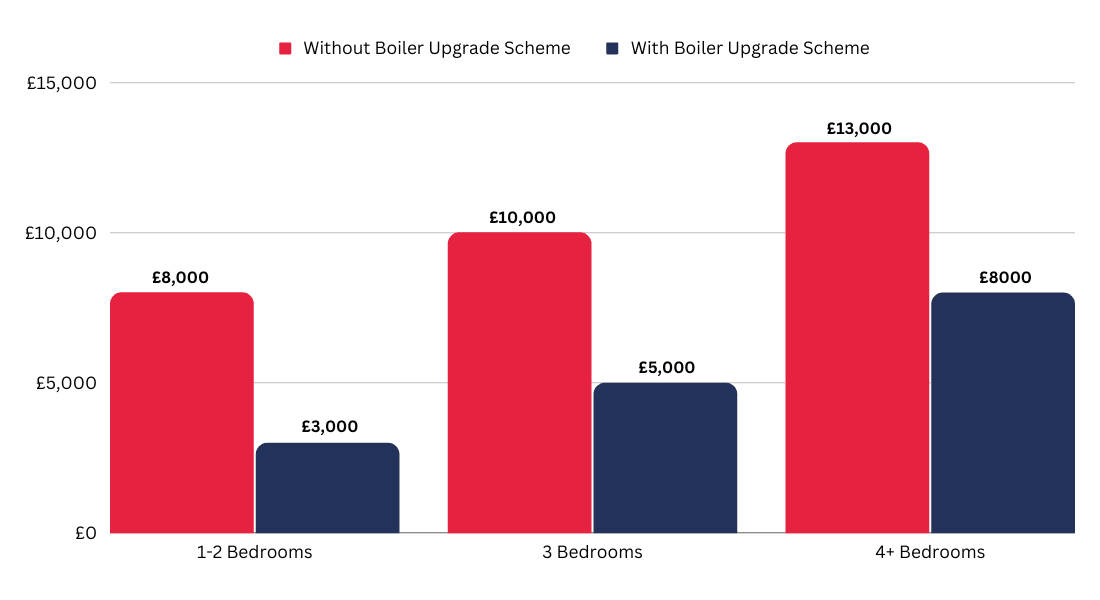Home / Government Grants / The UK Government Extends Boiler Upgrade Scheme Until 2028!
Introduction.
Commitments to continue flagship low carbon heat incentive for an additional three years is proposed in revised energy security plan with commitments to scale up manufacture as the Government has recently announced the Boiler Upgrade Scheme Extension until 2028.
The government will extend its Boiler Upgrade Scheme incentive until 2028 as part of a revised strategy to drastically expand heat pump use.
It is also committed to consult on introducing requirements for manufacturers to ensure a certain number of heat pump installations in existing homes from next year as a proportion of boiler sales. There is also a push for cutting the disparity in the cost of electricity when compared to natural gas to improve the long-term economic benefits of adopting heat pumps.
These measures have been set out in the ‘Power Up Britain’ energy security plan that has been published by the Department for Energy Security and Net Zero.
The plan is intended to serve as an official response to the recent independent review of the government’s net zero policy. The review called for reforms in a number of areas such as heat policy.
As a response to the review, a wide range of commitments are detailed in the new government plan to help decarbonise the country’s energy supplies, along with how the UK’s buildings and vehicles are being powered..
Boiler Upgrade Scheme Extension.
The government said that the Boiler Upgrade Scheme Extension would run for an additional three years to coincide with aims to ensure a minimum of 600,000 heat pumps are being installed annually from 2028. The plan said that the existing marketing campaign for the Boiler Upgrade Scheme would be enhanced to help address criticism about the level of consumer awareness about the scheme.
Further consideration would also been given to calls within the net zero review for potentially introducing a ban on the sale and installation of any natural gas boilers from 2033, the government said in the plan.
It added: “The government has an ambition to phase out all new and replacement natural gas boilers by 2035 at the latest.”
Another commitment in the new energy security plan is the launch of a £30m Heat Pump Investment Accelerator. This fund aims to encourage the increased manufacture of heat pumps in the UK by helping to leverage £270m in private investment to scale up manufacturing and improve supply chains.
The plan stated: “Heat pumps are an important part of the future of heating as they are significantly more efficient than traditional boilers, use cleaner energy, and should reduce bills relative to fossil fuel heating.” The Boiler Upgrade Scheme Extension is a way to market heat pumps for a few more extra years and help the rollout of this green initiative.
Discover our list on the pros and cons of Air Source Heat Pumps!
How Much Does an Air Source Heat Pump Installation Cost?
The average cost of installing an air source heat pump typically costs between £8,000-£18,000 for an average size house. This cost is determined by various factors such as the size of the pump, type and the complexities involved in the installation process. If you are looking to install an air source heat pump along with similar home improvement projects such as underfloor heating or new air conditioning units, the installation cost can be lower. With the Boiler Upgrade Scheme extension, this now means you have more time to decide on your future heating system.
Air Source Heat Pump Installation Cost.
Total Cost: £8,000 – £18,000
Time taken for Installation: 1-3 days
Lifespan of an Air Source Heat Pump: up to 25 years
Heating Capabilities: Endless 🙂

Manufactures Obligations.
A consultation has also been launched alongside the report with the aim to introduce a Clean Heat Market Mechanism from 2024. If introduced, this would require heating system manufacturers to install a certain number of heat pumps as a proportion of UK sales of natural gas or oil boilers.
Targets proposed in the consultation for the first year of the scheme would mean that heat pump installations must amount to four per cent of gas boiler sales over 20,000 units, or four per cent of relevant oil boilers of more than 1,000 units sold.
Boilers designed as being ‘hydrogen ready’ would also be considered as counting towards a manufacturer’s obligations under the proposed a Clean Heat Market Mechanism. Hydrogen Ready is a term used to describe systems able to run on the existing natural gas grid and then later be converted by engineers to run on a sull supply of hydrogen.
The consultation, which is receiving feedback until June 8th, proposes reviewing and increasing the proportion of heat pump installations required by manufacturers on an annual basis.
The proposals stated that all obligated parties would be required to install a certain number of heat pumps in domestic properties with a capacity of up to 45kWth. The obligations would apply to electrically driven heat pumps that can provide both space heating and hot water. This would apply to ‘air-to-water’, ‘ground-to-water’ or ‘water-to-water’ heat pumps that the consultation concluded could be retrofitted to around 85 per cent of UK homes with water-based central heating systems.
Hot water-only heat pumps and air-to-air systems would not qualify as acceptable installations under the Clean Heat Market Mechanism!
The consultation stated: “Low-temperature heat pumps can deliver high levels of energy efficiency, emission reductions and thermal comfort, generally have lower running costs than many other low-carbon heating systems and can be widely deployed. However, at least at the outset of the scheme, we do not intend to treat higher-temperature heat pumps differently from low-temperature systems, not least because many modern higher-temperature heat pumps are themselves highly efficient and operate at low flow temperatures most of the time.”
Another focus of the energy security plan intended to increase the commercial appeal of heat pumps is focused on reforming the cost of electricity compared to natural gas.
The government accepted that low carbon products were both efficient and cheaper to run in the long-term. However, it said these cost benefits were undermined by distortions in the price of electricity and gas. The latest energy security plan has therefore set out a planned schedule to look at ‘rebalancing’ electricity and gas prices.
The energy security plan stated: “We accept the Skidmore Review recommendation that government should commit to outlining a clear approach to gas vs. electricity ‘rebalancing’ by the end of 2023/4 and should make significant progress affecting relative prices by the end of 2024.”
“Rebalancing will generate the clear short-term price signal necessary to shift both households and businesses to lower-carbon, more energy efficient technologies like heat pumps. This is vital to meet government’s existing decarbonisation commitments, including our goal of 600,000 heat pumps installed per year by 2028.”
Energy Efficiency.
Another focus of the new plan is focused on energy efficiency. The government said that it would provide £1bn in additional investment via a revised Energy Company Obligation (ECO) mechanism known as the “Great British Insulation Scheme”. Under the programme, an additional 300,000 homes across the country with low levels of energy efficiency would be expected to save up to £400 on their annual bills from 2026.
These commitments have been proposed alongside previously announced ambitions to provide £6bn towards energy efficiency in buildings from 2025 following the next general election – if the government remains in power. The funding is intended to help by the end of the decade to cut energy demand in buildings by 15 per cent of 2021 levels.
Get in touch to request a call back!
Article Content
Recent Articles
Newsletter Sign Up
Keep up to date with latest news and industry insights.





